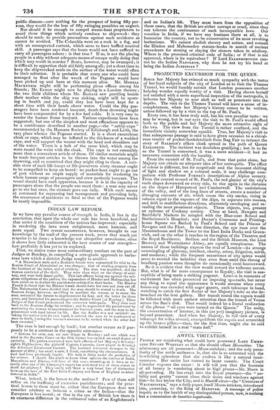INDIAN LAW REFORM.
Ii' we have any peculiar source of strength in India, it lies in the conviction, that upon the whole our rule has been beneficial, and that under it the condition of the natives has improved; especially in rendering the laws more enlightened, more humane, and more equal. Two recent occurrences, however, brought to our knowledge by the mail of the present week, prove that much yet remains to be done; a knowledge not altogether unwelcome, since it shows how little exhausted is the best source of our strength— how profitably it has yet to be explored.
First, we notice some most extraordinary conduct on the part of Judges at Bombay, in compelling a retrograde approach to barba- rous laws which a district Judge sought to avoid-
" A Mussulman male and a Brahmin female were committed for trial to the Session Court of Ahmedabad on two charges ; that of stealing property from the husband of the latter, and of adultery. The man was acquitted, and the woman convicted of the theft. They were then tried on the charge of adul- tery, and were both found guilty. This last offence being one against the reli- gions obligations of the parties, the expounders of Hindoo and Mahomedan law were called on to declare the punishment ordained in their books. The Hindoo Pundit declared that the Hindoo female should have her ears and nose cut off. The Mahomedan Cazee decided that the man should be stoned to death. The Sessions Judge, however, unwilling to mutilate the woman or to stone the man, sentenced the former to imprisonment for four, and the latter for three years, and forwarded his proceedings to the Sudder Court [at Bombay]. Three Judges of that Court pronounced the sentences inadequate. They were sent back to the Sessions Judge for revision ; and he augmented the punishment by sentencing the woman to imprisonment for fourteen years, and the man to im- prisonment with hard labour for life. But the Sudder was not satiated: so, taking the matter into its own hand, it ordered the man to be condemned at once to death, leaving the woman's sentence to be revised when the other had been executed."
The case is bad enough by itself; but another occurs as if pur- posely to be a contrast in the opposite extreme-
" Actions for crim. con. are rare things in Bombay ; and one which was tried in the Supreme Court on the 10th instant has excited no small degree of curiosity. The parties concerned were both officers of her Maksty's Seventy- eighth Highlanders; the plaintiff Captain Cummin, (now absent in S,:inde,) the defendant Lieutenant Garrott. The husband recovered damages to the amount of 200L; too small a sum, I think, considering the circumstances. A duel had been previously fought. The lady is living under the protection of her seducer. I should like much to know what opinion the natives of India, Mussulman and Hindoo, will form of this case; occurring, as it does, so re- cently after one of the Company's courts has sentenced two of these castes to death for adultery ? They surely will`draw a very broad line of distinction between the laws of the East India Company and those of England as admi- nistered in India."
What, indeed, is the lesson to the natives ? Few of them will refine on the inefficacy of excessive punishments; and the prac- tical. lesson to them must be, either that the European does not consider adultery so heinous a crime as the Indian—that the European is less moral ; or that in the eye of British law there is an enormous difference in the estimated value of an Englishman's and an Indian's life. They must learn from the opposition of these cases, that the British are either corrupt or cruel, since they can tolerate the continuance of such incompatible laws. Our vocation in India, if we have any business there at all, is to humanize the country, not to he conservative of its most revolting barbarisms. We cannot abolish slavery and suttee, and consult the Hindoo and Mahomeden statute-books in search of ancient precedents for stoning or slaying the sinners taken in adultery. Where is the promised criminal code of India; or if that is not approved, where is its equivalent ? If Lord ELLENBOROUGH can- not be the Indian NAPOLEON, why does he not try his hand at being the Indian JUSTINIAN ?


























 Previous page
Previous page